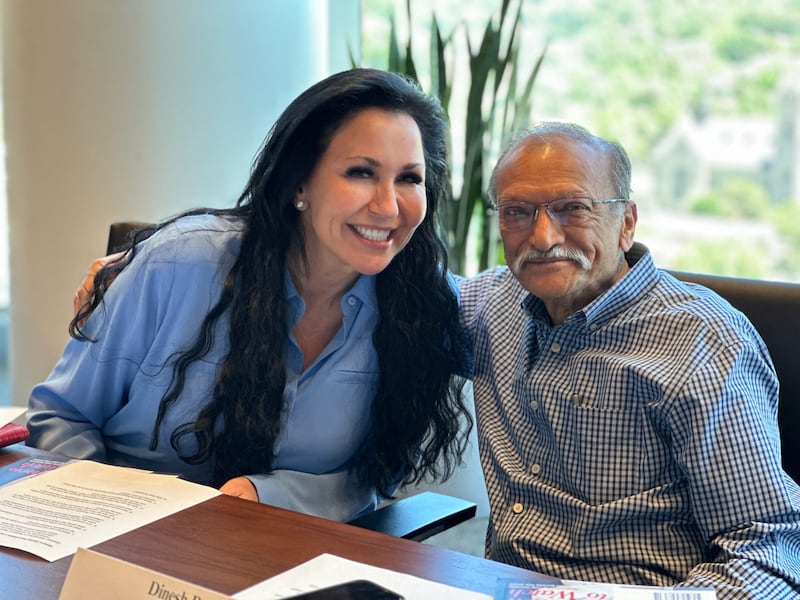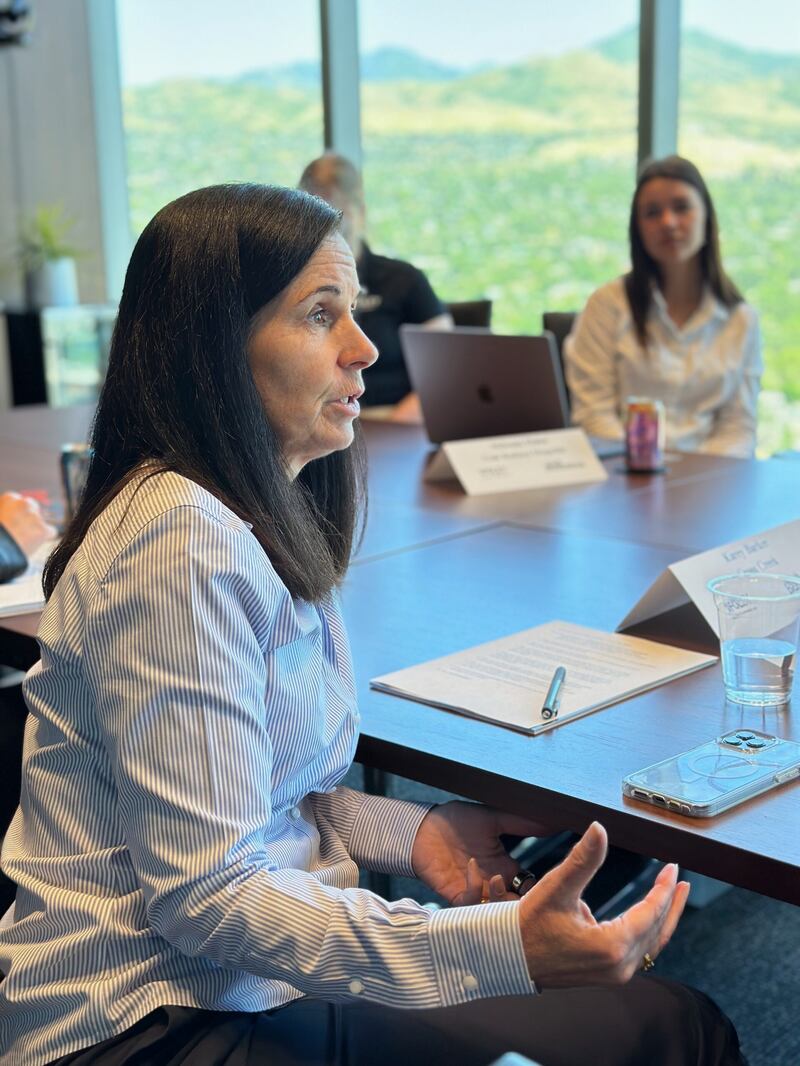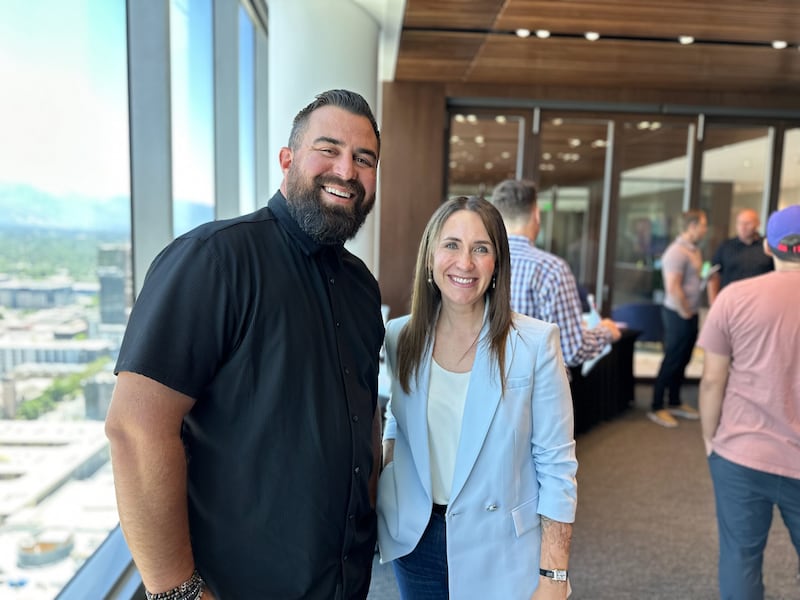This story appears in the July issue of Utah Business. Subscribe.
Last month, Utah Business partnered with Foley & Lardner to host a roundtable featuring Utah’s venture capital leaders. Moderated by Amy Rees Anderson, founder and managing partner at REES Capital, they discussed perfecting the pitch, the pros and cons of incubators, protecting one’s reputation and more.
What are your pet peeves when it comes to business plans submitted by companies seeking capital?
Davis Warnock | Managing Director | Victor Charlie Partners
There needs to be a holistic conversation about the business. You want to know the team. You want to know the market. If I can’t read the business plan and understand what the business is, who it’s chasing, and how it makes money, it’s hard for it to stand out against all the others.
Blake Modersitzki | Managing Partner | Pelion Venture Partners
One of my partners used to say that if you can’t explain the business on the back of your business card, it’s too complicated. VCs have a very short attention span. If we can’t get it on the first page, we’ll just move past it.
Tyler Richards | General Partner | Startup Ignition Ventures
Our pet peeve when it comes to a business plan is not doing enough customer discovery. Have you done enough? Have you done any? We look for a validated business model more than a business plan — the whole scope of what the business is creating, capturing and delivering within a marketplace.
What are some of the worst mistakes entrepreneurs make while giving their pitch presentations?
Anne Marie Leavitt McDonald | Managing Director | Mam Capital
You’ve got to be concise. Don’t go into the business’s three- and four-step plan. Sell me on how you will execute the unit economics and let’s go.
Jaxon Stuart | Principal | Spacestation Investments
Many vendors assume we are smarter than we are and get right into the weeds. We recently talked to a company, and they skipped one of the most critical parts of the pitch. They just thought we knew the space. While we all have expertise, that doesn’t mean we know your company’s niche.
Davis Warnock | Managing Director | Victor Charlie Partners
One of the biggest bummers for me is when the things I wrote in my notes in a face-to-face conversation don’t align with the data in the data room. I don’t know what’s true, which lengthens the due diligence process.
Jack Boren | Managing Partner | EPIC Ventures
We see thousands of deals a year; finding ways to kill deals quickly is convenient so we can focus on things that make more sense. What increases your probability of getting a second meeting is if you get an introduction from a trusted source — someone we’ve worked with, who we like, who we’ve been successful with. Then I know somebody smart vetted this already.
Cory Cozzens | Partner | Philo Ventures
Entrepreneurs need to be extremely clear about what they’re building, what it will do for whom, and what value it will create. A couple of months ago, somebody pitched me, and the whole time, I had no idea what the guy was talking about. To me, that indicated that he hadn’t nailed the idea down to its basics yet.

How do you successfully balance the dual relationship of being both competitors and collaborators with other VC firms?
Aaron DeRose | Co-Founder | Swell Capital
There is never a single deal that is worth compromising your brand or your reputation. The probability of us being in several deals together over time is high. You’d never want to do something on one that compromises the next 10 or 15. Those relationships and trust win in the long term.
Dinesh Patel | Founding Partner & Managing Director | Patel Family Investments
The entrepreneur thinks we are competing, but it’s a cooperative visit. You are going to have three rounds. If you screw somebody in the first one, you’re not going to get that money. We’re all cooperating, putting a deal together that works for everybody.
Cory Cozzens | Partner | Philo Ventures
It is worth noting what competing even means. It’s not trash-talking each other; it’s competing on how much I believe in your company, what terms I’m willing to give you, and how much I’m willing to put in.
John Mayfield | Founder & General Partner | Album VC
One lesson I’ve learned is that you’re playing over a decade, not on a single deal. Do what’s right for the entrepreneur, not just the VC, because this is a human business. When there are too many people, I think it is good for someone to step up and step away.
What are your thoughts on incubators and accelerators in Utah?
Phil Williams | Partner | Signal Peak Ventures
The great thing about accelerators is that they’re an opt-in experience. Good entrepreneurs interview past participants and talk to them about their experiences. We’ve had companies go through multiple accelerators; it’s not a one-time decision. Having more accelerators and incubators in Utah would be a net benefit for this community.
Ted McAleer | Co-Founder & Board Member | Park City Angels
Young entrepreneurs and first-time entrepreneurs can benefit from a community-driven process. Many universities in the state are doing a great job teaching entrepreneurship through an incubator model. However, there are accelerators that have somewhat of a predatory term sheet. It’s important to understand what you’re going to get.
Gabi Tellez | Managing Director | Utah Innovation Fund
The Utah Innovation Fund was created to help fund early-stage companies with connections to an institution of higher education. Our group has also been tasked with creating commercialization as a shared service, meaning all Utah higher education institutions should have the same resources. Jefferson Moss, one of the managing directors at the Utah Innovation Fund, directs all those efforts alongside the fund.
Karey Barker | Founder & Managing Director | Cross Creek
We’re seeing big growth in industry-specialized incubators. Biotech incubators often offer shared workspaces and equipment. You can rent an hour on a sequencer instead of having to buy! That’s very helpful for these companies to have that access. And it’s not just biotech — if you’re a company that wants to start an AI, you can use your incubator’s engineers to help you build your platform. You’ve got a workspace and all these colleagues working in the same industry. That’s super interesting.
John Mayfield | Founder & General Partner | Album VC
The more opportunities entrepreneurs have to become educated and plugged into a system, the better. But for me, it’s a bit of a demerit if entrepreneurs lead with, “Hey, we did this incubator. Therefore, you should be interested in us.”
Blake Modersitzki | Managing Partner | Pelion Venture Partners
We like them. We’re fine with the educational component. The red flag is onerous terms and structure. Some of the universities want 10 percent, and you can never dilute them. Those are the sorts of things where we look at them, we appreciate and we politely pass.
Trent Mano | General Partner | Convoi Ventures
Accelerators say, “This is what it takes for us to do this deal.” Founders choose if that’s a bad deal or worth the risk. Our attorneys need to know what’s market and what’s not market so they can help founders make that decision. I thought some local programs were predatory, but some companies wouldn’t exist without the accelerators.
Jeff Bowman | Partner | Foley & Lardner
As a community, we’re very good at educating each other. But a lot of these programs have sponsoring attorneys to whom the founders are being referred. Those attorneys may not be as quick to notify the founders of the perils of dealing with an incubator.

How do you think venture capital has changed in the last few years? What current trends are you noticing?
Karey Barker | Founder & Managing Director | Cross Creek
Venture has changed dramatically. There are more players who are more competitive and much more global. Venture was a U.S. thing that now has spread across the globe. Recently, the market has been frozen, particularly at a later stage. In ’21 and ’22, any company with a pulse was raising a big up round. We went through a frothy, stupid period in venture, and I think the stupidity is waning.
Aaron DeRose | Co-Founder | Swell Capital
I agree. During the ’21 timeframe, the amount of capital going into companies, the valuations, the terms, how fast things were moving — it was ridiculous. It was growth at all costs; nobody cared about profitability. The purpose of venture was to fund you until your next round until you sold for $10 billion. Then the pendulum swung to the other side: The only purpose of raising capital is to break even or be profitable. It’s unfortunate things have been so extreme.
Anne Marie Leavitt McDonald | Managing Director | Mam Capital
I would say the current yellow brick road really is about how quickly you can become more profitable than ever. That is a big indicator of how that pendulum continues to swing.
Jeff Bowman | Partner | Foley & Lardner
In some ways, it’s a down market, but it’s not a classic slow market — it’s defensive. The numbers suggest that there’s capital sitting on the sidelines. To me, that’s encouraging. Hopefully, as things normalize across the spectrum, deals will pick up.
What advice would you give to any founder in the current market?
Kat Kennedy | General Partner | Kickstart
The reality of the entrepreneurial journey is that, at first, it’s about survival. You’re constantly managing what helps you survive and what keeps the long term in view. We need to educate entrepreneurs on the implications of making long-term decisions in moments of survival.
Jack Boren | Managing Partner | EPIC Ventures
Entrepreneurs need to know how to motivate employees. If your current strategy is to break even and grow 10 percent, how do you attract great talent? Especially if you’ve pegged your last valuation at 2-3x what it really should be? There has to be a reset if that company wants to attract the right talent.
Phil Williams | Partner | Signal Peak Ventures
Entrepreneurs should manage their cap tables like a relationship. They shouldn’t make any quick decisions because once you put somebody on your cap table, you can’t unwind that. You should go in eyes-wide-open. Spend some time getting to know each other. Talk to references.
Dinesh Patel | Founding Partner & Managing Director | Patel Family Investments
I tell entrepreneurs that if you get something from a university, you ought to give back. I’m a big proponent of universities taking equity in the company. Now you’re partners; you’re not fighting each other.
What can we do better as investors?
Kat Kennedy | General Partner | Kickstart
When founders take on venture capital, they are agreeing for that to become liquid at some point, which means selling their company or going public. I like to sit down with those I’m writing a check to and say, “As you take this, you are agreeing to sell your company at some point. And here is what we would like to see.” All too often, founders don’t understand the business of venture capital and the expectations we have.
Gabi Tellez | Managing Director | Utah Innovation Fund
We owe it to the companies we look at to have those hard conversations. There are several that I want to succeed, but their business model is such that they’re never going to be in a situation to sell or go public — maybe simply because they don’t want to. We need to be blunt and transparent with companies, discussing alternative ways to get funding.
Tyler Richards | General Partner | Startup Ignition Ventures
We’re the feedback loop for entrepreneurs. If they’re not hearing it from us, who are they hearing it from? We must be honest about what we are looking for and what’s working or not. Giving constructive feedback is the only way that they can actually pivot or learn. It’s our duty as investors to provide that.
What columns, podcasts or blogs do you find the most value in? Where do you turn for good information?
Ted McAleer | Co-Founder & Board Member | Park City Angels
One of our colleagues at Park City Angels, Tim Cooley, wrote “The Pitch Deck Book.” It tells you the purpose of the pitch meeting is not to ask for the money but to get to the next pitch. If you don’t have time to coach somebody, just give them “The Pitch Deck Book” and let them teach themselves.
Trent Mano | General Partner | Convoi Ventures
I recommend Harry Stebbings, founder of 20VC, “The 20 Minute VC” podcast.



